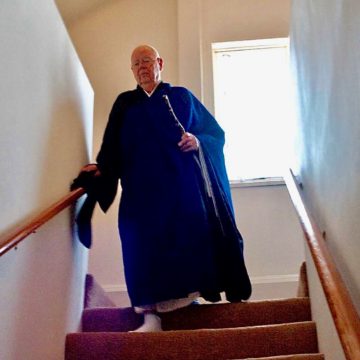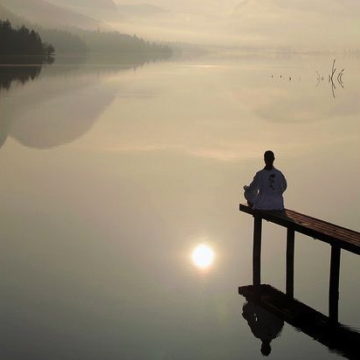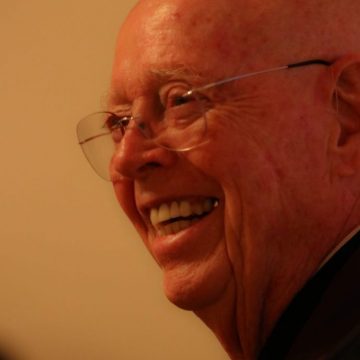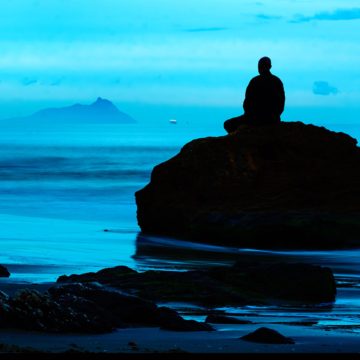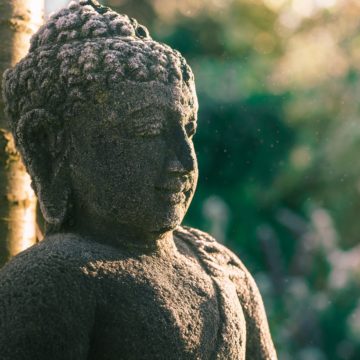Dharma talks that were given by Nyogen Roshi at the Hazy Moon might have been inspired by a koan, a sutra, the writings of our Zen ancestors, modern scientific explorations, a student’s question, or today’s headlines. In every talk, you hear the vitality of the living word, the spontaneous expression of prajna flowing from the awakened mind that cuts through our confusion to encourage and invigorate our practice.
Beating the Drum
Kasan said, “Cultivating study is called learning. Cutting off study is called nearness. Going beyond these two is to be considered real going beyond.” A monk came forward and asked, “What is real going beyond?” Kasan said, “Knowing how to beat the drum…”
Undivided Activity
Weaving some of Maezumi Roshi’s commentary into a talk on Zenki—”undivided activity”—Nyogen Roshi reminds us that all the Buddhist teachings are pointing directly at the individuals who receive them. “What is Buddha?” Roshi asks. “Buddha is awake! Who is awake? Is there anyone there but yourself?”
Awareness
In a powerful talk that touches on the six perfections in Buddhism as well as Dogen’s writing on samsara and nirvana, Nyogen Roshi exhorts us to cultivate selfless awareness through our practice…
Perceiving and Believing
Reflecting on why more of his students aren’t experiencing breakthroughs in their practice, Nyogen Roshi indicts a lack of faith in the practice itself as the culprit. Specifically, he pinpoints a cynical reluctance to believe anything that we haven’t personally perceived as the hindrance to insight. “When you hear about some of the wonders that […]
Just Enter the Stillness
Doing non-doing is the essence of Zen. Far from laziness or indifference, the stillness of zazen is the site of transformation. But reaching the still point does take effort. “Sustained effort will lead you into the joy,” Roshi tells us, “into the wonder of what your life is truly all about. The doorway opens there–all pathways lead from that point.”
Koans
Far from being anachronistic curiosities or puzzles to tease the intellect, koans are literally steps on the path of liberation. In his introduction to a translation of The Blue Cliff Record, one the the classic koan collections in the Zen tradition, Maezumi Roshi wrote, “You yourself become the case–this Blue Cliff is your very life.” […]
The Death of Me
Reading from the book “Awareness” by Anthony de Mello–a Jesuit priest and psychotherapist who grew up in Mumbai, India–Nyogen Roshi marvels at how much the Jesuit’s teaching sounds like instructions from masters in the Zen and Tibetan traditions. “Death is not a tragedy at all. Only dead people fear death…”
Writing on Water
A talk on emptiness begins with Nyogen Roshi’s recounting the experience of “writing on water” with a stick when he was a boy growing up in Colorado. Far from indifference to the world around us, Roshi says, realizing the emptiness of all things through Zen practice entails profound spiritual awakening…
The Authentic Gate
Inspired by Yamada Roshi’s account of his kensho in the book, “Zen: The Authentic Gate.” Nyogen Roshi encourages us to remember that just as suffering and death are real, enlightenment is also real. “Without enlightenment, there is no Zen Buddhism,” Roshi says. “Yamada wasn’t some mythical character. I met him! He was a remarkable man […]
What Is This Practice?
Recalling a talk that he gave when he was Maezumi Roshi’s student, Nyogen Roshi tells us he said he wanted to practice “blue-collar Zen”–it had to work in the grim places where he often found himself as a social worker specializing in child protective services…
Awakening in the Marketplace
Wherever Dharma is being manifested it is always this state of awareness here with each one of us. There are no barriers except for what we erect in our thinking minds. You can’t overcome thoughts by trying to suppress thoughts, but that’s what we often do when we begin…
How Do You Practice?
“Do you want emancipation?” Nyogen Roshi asked in a recent talk on the enlightenment experience of Seigen Gyoshi, the Seventh Zen Ancestor. “Do you want freedom from birth and death? Only when you begin to open the eye clearly will you see how a shadow of an attitude shapes your experience of this…”

